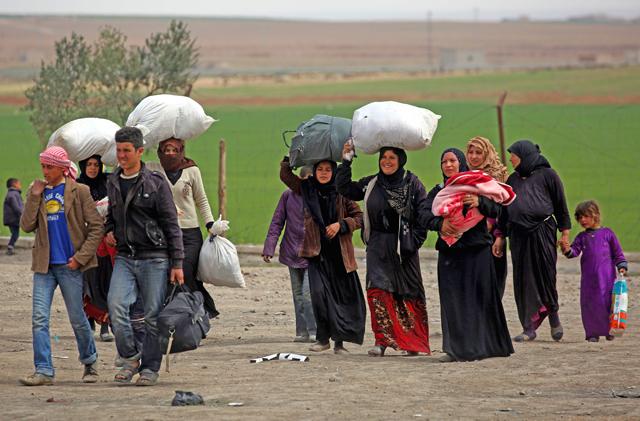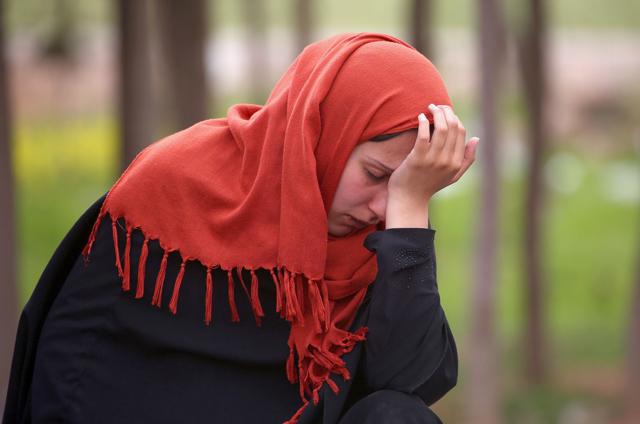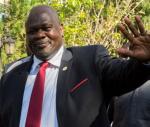You are here
Syrians flee Raqqa ‘hell’ as US-backed assault nears
By AFP - Apr 01,2017 - Last updated at Apr 01,2017

Displaced Syrians, who fled the Daesh stronghold of Raqqa, arrive at a temporary camp in the village of Ain Issa on Friday (AFP photo)
AIN ISSA, Syria — In a muddy camp in northern Syria, civilians who fled Raqqa said fear of an expected US-backed assault on the Daesh terror group bastion was reaching a fever pitch.
This week, hundreds of civilians escaped Raqqa and headed north to the camp in Ain Issa, in territory controlled by the Syrian Democratic Forces (SDF), a US-backed Arab-Kurdish alliance.
As part of their campaign to capture Raqqa, the extremists' so-called "caliphate", the SDF have been bearing down on the Daesh-held town of Tabaqa and the nearby vital Tabaqa Dam over the past 10 days.
Rumours that Syria's biggest dam would collapse and flood Raqqa, 55 kilometres downstream, have sparked panic in the city.
"The hisbah [religious police] announced over the megaphones 'the land of Muslims will be flooded, the Tabaqa Dam has collapsed,'" said Mohammad Mahmoud, 38.
Mahmoud, his brother and both their families paid $1,000 to a smuggler and fled Raqqa on foot earlier this week.
"I was so afraid, I couldn't think straight," he said.
The camp where he has found shelter is home to several thousand Syrians displaced by war, including 400 families who arrived this week from Raqqa.
Children waddled through makeshift pathways between tents emblazoned with the logo of the UN refugee agency (UNHCR), clutching sandwiches and water bottles.
Inside tents, men waited for their turn to have their Daesh-mandated beards shaved then examined their bare chins in a
small mirror.
'It's hell there'
Mahmoud's face was weighed down by exhaustion, his clothes covered in dust.
He hovered protectively around his elderly mother who sat in a wheelchair, its wheels caked in mud after their arduous 14-hour trek out of Raqqa.
“It’s hell there. Fear rules over everything,” he said as took apparent pleasure puffing on a cigarette, a vice which Daesh banned when they captured Raqqa in 2014.
“[Daesh] is finished now. Most of its fighters fled to Mayadeen or Albu Kamal,” two towns in the oil-rich eastern province of Deir Ezzor, most of which is under Daesh control.
At the entrance to the camp, Kurdish police units — known as Asayesh — searched visibly shaken new arrivals.
Ahmad, a Raqqa native in his 50s, said residents seized the opportunity to flee when they saw Daesh fighters leave.
“We were no longer afraid to flee Raqqa like before, because Daesh militants were less and less visible,” he said, his six children perched atop suitcases packed with their belongings.
Ahmad said the extremists “abandoned most of the dams, built tunnels around the city” and protected their positions with sand bags.
He said the journey to Ain Issa was traumatic.
“We were so terribly afraid of the air strikes, that the coalition might think we are Daesh militants,” he said.
‘Daesh is afraid’
“Daesh is afraid of the assault on Raqqa,” a 25-year-old man who asked to use the pseudonym of Zuhair for security reasons, said.
“Many of their fighters fled with their families on motorbikes and there are fewer and fewer checkpoints,” he said.
But even as the extremists left “they warned residents ‘not to go to the infidels’”, said Zuhair, who still has relatives trapped in Raqqa, a city of 300,000 residents.
“I don’t know what happened to them.” he said, tearing up.
Daesh applies an ultra-conservative interpretation of Islamic law in territory under its control, torturing or executing law-breakers.
Zuhair said he was jailed and lashed by extremists several times for selling tobacco in defiance of a Daesh ban.
“But if I hadn’t taken the risk, I couldn’t have fed my family,” he said, crouched near his one-year-old daughter Qamar.
Syria’s conflict began in 2011 with anti-government protests, but has since turned into a multifront war that has killed more than 320,000 people and forced millions to flee their homes.
Since March 21, the battle for Tabaqa town and the dam has killed at least 110 civilians and 68 extremists, according to the Britain-based Syrian Observatory for Human Rights which monitors the war.
It said SDF fighters were around two kilometres from Tabqa.
Jilal Al Ayyaf, who runs the camp in Ain Issa, said he was bracing for an influx of displaced people as the SDF press their advance.
“The more the noose tightens [around Daesh], the more displaced people we’ll get,” he said.
Related Articles
AIN ISSA, Syria/AMMAN — People from Raqqa are fleeing their city under cover of night as US-backed forces close in on the Daesh terror group
AIN ISSA, Syria — When Saada Al Aboud saw Daesh militants bringing weaponry into her village near their Syrian bastion of Raqqa, she feared
BEIRUT — The US-backed Kurdish-Arab force leading the fight for the Daesh terror group's Syrian bastion Raqqa announced Tuesday the creation















